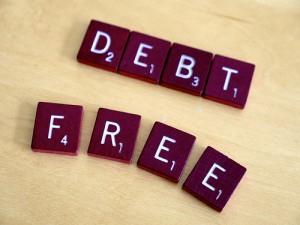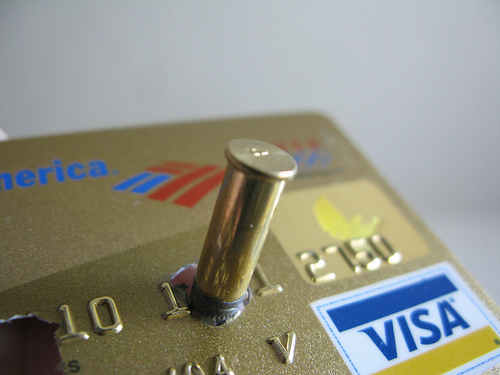For many people, credit card use becomes a cycle of debt that can be difficult to get out of. It may seem like all your efforts to chip away at your debt are fruitless, and that adding more to your credit card balances is the only way to stay afloat. People in a cycle of credit card debt often live paycheck to paycheck, with nothing left over to add to savings.
Fortunately, you can break the cycle. With dedication and some advanced planning, you can pay down your credit cards and keep yourself from slipping back into debt. But how?
Here are the steps you can take to gain control of your finances and remain free from the crippling cycle of credit card debt.
1. Combat feelings of hopelessness
First, remind yourself that getting out of debt is achievable. If you foster feelings of hopelessness, with thoughts such as “I can never pay off my high credit card balances, so why bother,” then you’ll never find the motivation necessary for success. Instead, tell yourself that getting out of debt is not only possible, but easier than you think. It’s going to take some time, and you may feel like you’re not making much progress, but little by little you’ll be closer to your goals of financial stability.
2. Force yourself to stop using your credit cards
To get out of debt, you can’t continue to add to your already-bulging credit cards. Months of payments can be eliminated by a few purchases, so eliminate the option entirely. The simplest way to reduce credit card debt is to stop using them altogether while you’re paying them off.
3. Craft a workable budget: it is possible!
Everyone’s situation is different, and no two budgets will look exactly alike. Keep that in mind as you craft your budget; it may take a while to find what works for you.
All budgets have one thing in common: they differentiate between “wants” and “needs.” Put your needs in one column and your wants in another column. Find ways to cut back on the wants, so that you can maintain your needs.
4. Make a plan to pay down credit card debt
Once you have a workable budget in place, you need a plan for paying down your credit card debt. There’s more than one way to pay off a credit card; read our recent blog on two different approaches, “Snowballing,” and “Avalanching.”
5. Once your debt is paid off, take a break from credit cards for a while
Although using your credit is important to building a good credit score, don’t be in a rush to start using credit cards right away. If you take a break (6 months to a year) from credit cards, it won’t affect your score all that much, and you’ll be much less likely to slip back into debt.
6. Once you start using credit cards again, take it slow and always pay down your balance every month
Having a good credit score is important, and part of that is actually using credit. One way to use credit is to use credit cards, but unless you want to fall back into the cycle of credit card debt, you need to do so wisely. Take it slow at first, only making one credit card purchase per month. Then pay your balance down to zero, every single month.
7. If you find yourself slipping into old spending habits, stop using your cards and start the process over again
Everyone’s human, and you might notice yourself falling back into old habits.If you catch yourself doing this, then don’t be afraid to start the process over again. It will be easier the second time through, because you have already been here before. Plus, you’ll also have less debt to worry about this time around.
Always remember: don’t give up! Good credit and financial stability are worth it!
For more credit repair advice, check back with our blog for regular updates.
photo credit: rid of credit card debt via photopin (license)
photo credit: Debt Free via photopin (license)


Recent Comments